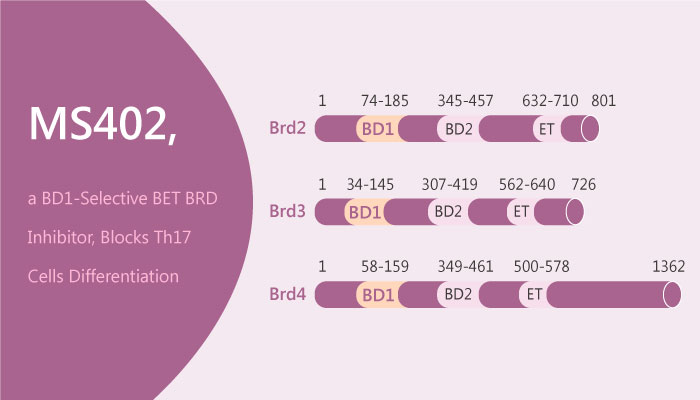T-helper 17 (Th17) cells is a unique CD4+ T-cell subset characterized by production of interleukin-17 (IL-17). Especially, IL-17 is a highly inflammatory cytokine with robust effects on stromal cells in many tissues. T-helper 17 (Th17) cells have important functions in adaptor immunity and inflammatory disorders. The bromodomain and extraterminal domain (BET) family proteins regulate gene transcription during lineage-specific differentiation of naïve CD4+ T cells, which produces mature T-helper cells. Of these are a family of bromodomain (BrD) and BET proteins consisting of Brd2, Brd3, Brd4, and testis-specific Brdt. CD4+ T cells are important immune cells in biology.

In this study, Kalung Cheung, et al reported a small molecule MS402. Crucially, MS402 is a BRD4-BD1 selective BET BrD inhibitor. MS402 selectively renders differentiation of Th17 cells over other Th cells from murine primary naïve CD4+ T cells. Moreover, selective inhibition of bromodomain of BET proteins with MS402 inhibits primarily Th17 cell differentiation. MS402 can selectively inhibit BRD4-BD1 over BRD4-BD2 of the BET proteins. MS402 also blocks Th17 maturation from mouse naive CD4+ T cells. Kalung Cheung, et al further demonstrated the therapeutic potential of MS402 in preventing and ameliorating adaptive T-cell transfer-induced colitis in mice through the disruption of Brd4 functions in gene transcription and Th17 cell development. Finally, the MS402-treated mice showed a significantly lower percentage of IL-17- and IFN-γ–producing CD4+ T cells in colon than the disease mice.
All in all, MS402 effectively prevents and ameliorates T-cell transfer-induced colitis by disrupting Th17 cell development, thus representing a therapeutic approach for inflammatory bowel diseases.